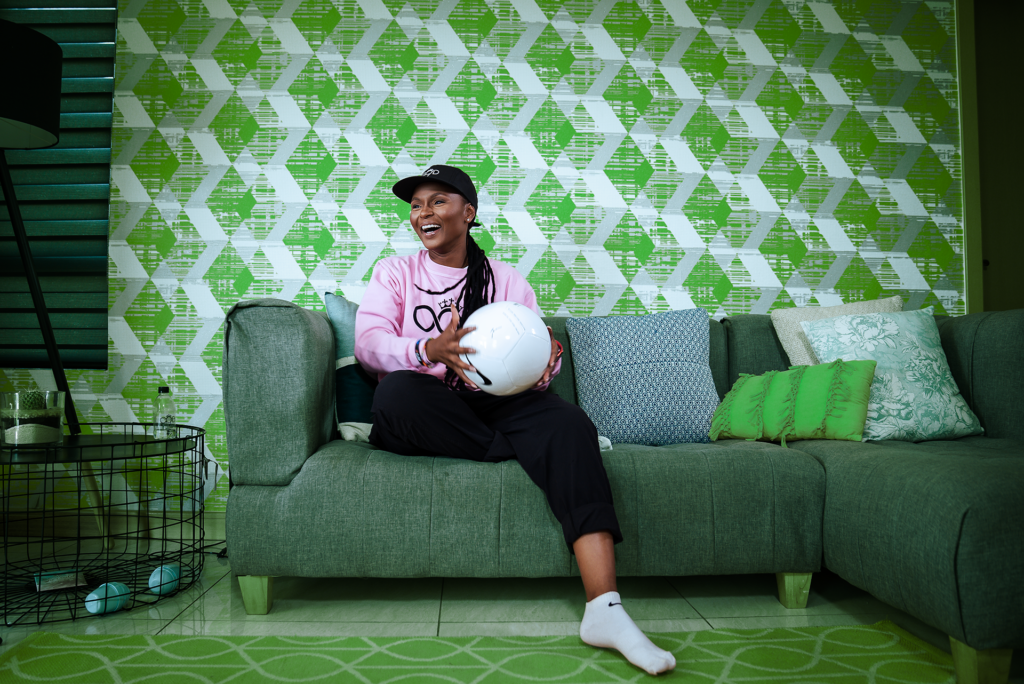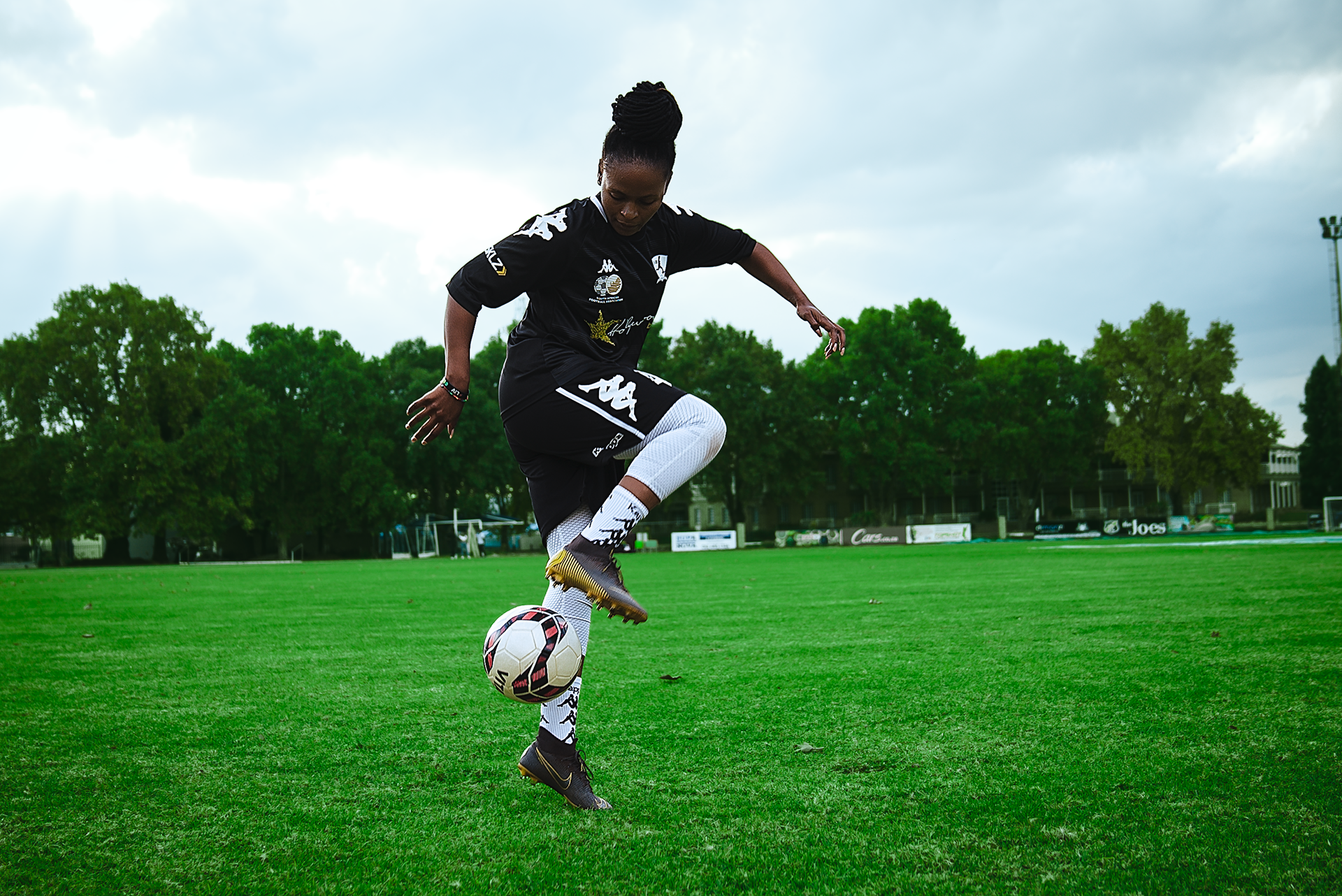Whether she’s on the soccer field or the small screen, former Banyana Banyana captain Amanda ‘Toki’ Dlamini continues to be an inspiration to many. Her journey was from playing football in the streets to representing the country during the 2016 Summer Olympics, and now she’s gracing our screens on Africa’s leading sports broadcaster, SuperSport. Not only is she a football analyst but also a brand ambassador, model and businesswoman. And she was recently appointed as Senior Commercial and Marketing Manager at the South African Football Association (SAFA).

Amanda is also part of Nedbank’s YouthX programme, powered by Unlocked.Me – a platform created to give the youth the necessary tools to help them unlock their full potential. As the YouthX Sports & Wellness Changemaker, Amanda hosted a masterclass where she shared valuable insights about the field, making sure that the youth are equipped and knowledgeable about careers and businesses in sports.
Below are some tips from Amanda on how she built a brand and career after Banyana Banyana.
How has the transition from professional football to retirement been for you? What are some of the challenges and key lessons you’ve learnt?
It’s a challenging journey. I’m always trying to have an overview of what is happening in different spaces. I have also learnt a few things along the way, which is good for my progress. Mentorship also helped me, and it goes a long way. Retirement is lonely. One has to keep reinventing oneself consistently and be brave enough to accept new challenges and face them head-on. I’ve also had to learn that not everything is for you. It’s easy to get carried away, so it’s imperative to remain true to yourself.
Congratulations on your new role at SAFA as Senior Commercial and Marketing Manager. What would you like to change while you are in this position?
Thank you so much. I think the most important thing is to learn. Then, I would like my opinion towards the visibility of women’s football to matter. I want close relationships with all the sponsors, and to contribute towards the vision of supporting and promoting our national teams.
You are part of Nedbank’s YouthX Live. How did you feel when Nedbank approached you to be the Sports & Wellness Changemaker and what would you like to achieve through this programme?
An overly excited and overwhelmed feeling consumed me because all I ever wanted was a platform to share my story, for young girls to have a reference, so that I can inspire others through my journey in sport.
Do you wish that a programme like this existed when you were younger?
I do. The only image I have in my mind is from primary school, of the Sharks rugby team visiting our school. Just seeing them and realising that this is what sport could do for me made me dream bigger. These days it is not easy to get superstars to visit schools. However, I wouldn’t trade having a social and digital platform such as this one for anything in the world. Imagine how many girls out there are still looking up to male athletes because there is limited visibility of female athletes as a positive reference in the sport. I believe the Nedbank Unlocked.Me platform will help transform many lives. So, it’s necessary, and I am so grateful to be part of the YouthX programme.
Do you think education and getting a degree played a role in getting you to where you are today? What’s your advice to young people who believe that only talent is enough?
Talent alone is never enough. Athletes have to equip themselves fully with insights from a book or going to varsity. Education can influence and change the way you think. As individuals, we all want to get ahead for a better future. You can do both. I would honestly like to encourage all athletes, irrespective of sports codes, that it’s crucial to get a qualification. You should balance your studies with your talent.
What tips can you share with footballers or athletes who are thinking about retiring? How can they look for opportunities off the field?
For me, it helped that I had a manager who’d consult with me. I’d bounce ideas off her. She was someone who knocked on doors for me to get better opportunities. It’s important to reinvent and align yourself with things or people who share your vision.
What do you think people in sport need to do to position themselves or prepare for opportunities such as broadcasting in sports?
I might not have the precise formula that will ensure success for everyone, but what worked for me was to have a vision of what my life would look like post-playing. I worked towards that. I had to put systems in place like investing in my craft. I put in extra hours of training and invested in my education. Having a matric was essential to me because that was one step towards a world of possibilities. My parents didn’t have enough money to send me to varsity. The little that they had sustained me enough until I could relieve them. I was awarded a sports bursary because of my marks in grade 12. I got an opportunity to study logistics through the sports bursary at the University of Johannesburg. My advice would be, choose a field that will benefit you. I wanted to go into the exports and imports business, which is why I took up logistics.
There’s life after football. Once I started getting an income, I realised that this was my only source of income. I disciplined myself when it came to managing my money. I trained even harder. I kept my position in the team. Being the captain helped me in developing the confidence to express myself in front of the camera. Until I got my job as a football analyst, I used all the opportunities presented to me. I gave it my best. Your current job could be an audition or preparation for your next job.

How did you manage to build a brand outside of football?
I used long-lasting relations with people who supported me from back in my footballing days. They became my client base. It’s crucial to treat your supporters with kindness. I wanted to fulfil my childhood dream of creating a brand that will inspire people to ‘own their royalty’ and to exist purely as themselves. I wanted to see how possible it is to dream and work hard. To see my dream become real. Also, I needed something that could create an income for my family, as women’s football is not financially supported or commercialised.
You’ve always had great style and now you have your own fashion line. What prompted the idea? How is it going?
After my first underwear contract with Jockey, I realised that I wanted to own an activewear brand driven by the many challenges a female footballer has. Ever since then, I have been designing a logo. I looked for references, avoiding clashes with other brands. It finally came together during Covid-19. I had to be brave, as I didn’t know what to expect. I had no financial guidance but I took a risk. I took this risk because I wanted to see my dream become a reality. To have so many people supporting the brand is just unbelievable. I’m so grateful. I hope we grow in leaps and bounds.
If you want to hear and learn more from Amanda Dlamini and other YouthX Changemakers (Sho Madjozi, Rich Mnisi, Theo Baloyi, Candice Chirwa and Rivo Mhlari), click through to the Unlocked.Me YouTube channel here Unlocked. Me – YouTube.
To stay on top of the conversations, follow the below social-media pages to stay connected, get the latest updates and learn more about YouthX.





























